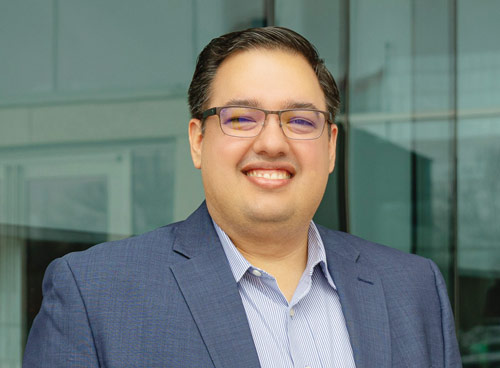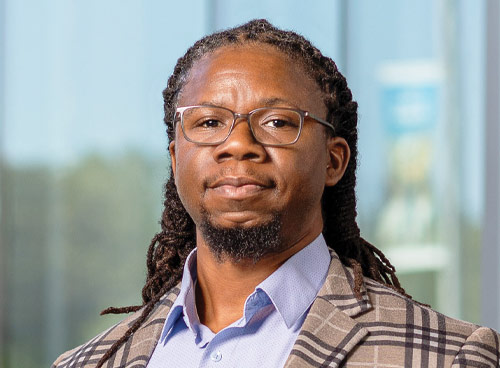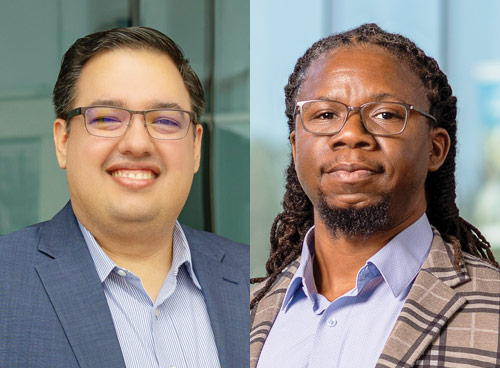Burns & McDonnell
Daniel Sierra is a Business Development Manager in Transmission & Distribution at Burns & McDonnell. Laron Evans is an electrical engineer and diverse business manager at Burns & McDonnell.


Decarbonization is growing, resulting in an urgent need for action to deliver on ambitious commitments, especially regarding utility infrastructure. To achieve these goals, workers are needed, and utilities along with their contractors and subcontractors, aim to help by increasing the diversity of the workforce across companies that engineer, construct, and modernize our nation's energy infrastructure.
In serving this unique role, utilities can bolster capacity to overcome their infrastructure challenges, such as the big role expected of transmission and distribution in the energy transformation, by cultivating a workforce that mirrors their communities. A part of that is helping diverse and small subcontractors learn how to get in on opportunities to compete with established companies.
To learn more about how this is taking place, Public Utilities Fortnightly went to two experts on helping the utility workforce achieve the skills and expertise necessary to meet these many construction challenges, while reflecting the diversity of the communities they serve. Burns & McDonnell's Daniel Sierra and Laron Evans have much to say on the subject.
PUF's Steve Mitnick: Daniel what is your role in your company?
Daniel Sierra: I'm the project development manager in our substation business line. I've been working at Burns & McDonnell for twelve years now and have worn a lot of different hats. I'm an electrical engineer and did substation design under Laron Evans. He was a mentor and lead on projects, so we have a close connection.
I'm also the business diversity liaison for our substation business line. That means I'm a part of any work on the substation design side that we subcontract to diverse companies, internally and externally. I work with our project management teams to make sure we're meeting the criteria we've set through Laron's leadership.
Externally, I meet with diverse business owners to get to know their companies, what their goals are, and how they have engaged with Burns & McDonnell in the past.
PUF: Laron, what is your role in your company?
Laron Evans: I was a lead engineer executing substation design and overseeing a team of engineers in 2017. Now, I'm the director of business diversity for Burns & McDonnell's transmission and distribution group.
I'm responsible for leading the strategy to include diverse owned businesses for our transmission and distribution businesses. That houses several markets, including substation, transmission line, distribution, underground submarine cables, pipelines, and telecommunications business lines.
I work with people like Daniel and managing directors of those groups to make sure there are goals and tactics to be more inclusive of diverse-owned businesses. For the last two years, I have been focused on making sure we have more people who will champion and lead the inclusion effort for our business lines and regional operations.
We now have full-time roles in certain regions. I'm thankful I've been able to contribute to the progress of our business diversity efforts nationwide.
PUF: Daniel on an everyday basis, for big projects, how do you make this happen?
Daniel Sierra: You've got to build trust and that takes effort. That's why I love what I do.
First, we're able to talk to clients about how important business diversity is and what their goals are when it comes to diverse spending. A lot of our project teams are focused on execution and providing great quality for our clients. Our role is to talk to clients about effecting business diversity in a positive manner, and how we can help.
We talk to our client teams about how we've had a relationship with XYZ company for many years, and bridge that gap as to what an opportunity might look like for that company. We have those relationships externally with the client, but also with our subcontractors and partners to make sure it's an easy transition. I say easy but it's never easy. No projects are ever easy.
PUF: Laron, what's a typical day like for you and why is this so important?
Laron Evans: We have several meetings internally and externally, whether strategizing with clients, supporting diverse business owners navigating our company or aligning opportunities with their capabilities. Plus, we regularly engage with several industry organizations. That generally is what the day-to-day is like.
What we do day-to-day is important for equity within our communities. That hits home because historically and currently, there are a lot of inequities.
If people are unaware of the inequities that have existed, they may develop behaviors that perpetuate them. Many of our utility clients and other industries realize there needs to be more equity across our communities.
All our communities must be healthier and safer. Community health encompasses so many things.
It includes economics, access to healthy food, clean environments, and more. Ultimately, that is why, and it drives what we do with business diversity.
PUF: It can be hard for diverse, but small subcontractors to figure out how to get in on opportunities and have a chance to compete.
Daniel Sierra: I think of a successful story withKeith Porta, CEO of APC, and we met him at a diversity conference about three years ago. We're a large organization, and you've got to get in contact with the right folks to get opportunities.
I decided that we were going to have a monthly meeting with Keith because we wanted to find out more about APC as there were opportunities. He got his first opportunity with Burns & McDonnell prior to our recent conference at Equity in Energy this past April.
When you get that first opportunity it's an extremely exciting time. Now, the mindset has shifted from getting that first opportunity, to how is APC going to maximize this first opportunity? Other partners of ours have had these first opportunities, and it's a critical time because depending on how the first one goes, it can lead to major future success.
We pour a lot into our partners to make sure they're successful. One of my strengths is I'm a connector. I love to connect our partners with our employee owners, and I'm honored to do that.
PUF: Laron, how do you find these people and then nurture the relationships?
Laron Evans: It involves months, even years of networking. It demands being strategic around which conferences we attend, as well as having a solid relationship with our clients, because they recommend a lot of companies.
That's the external connection but it's having the right connection internally as well, so we can put the right people in the room to have strategic conversations with business owners and stakeholders.
We've gotten a lot better with which conferences to attend. A few years ago, we encountered companies at some conferences we attended but their capabilities did not fit with what we were looking for in our T&D business. We had to take a step back and be more strategic regarding which conferences align with our business.
We became more efficient with connecting the right people. Not only for market segments, but regionally too, because if a company is only operating in the south, it makes no sense to connect them with our people in Washington who are doing construction work. It is having that organizational intelligence to draw lines and connect dots.
PUF: Daniel, why is trust important in internal operations?
Daniel Sierra: It takes trust both ways. It's just like us with staffing. When we have new employee owners that come to Burns & McDonnell, there's a trust level you have to build.
The only way you truly build trust is by taking that time and cultivating that relationship. For the majority of my career, we have self-performed engineering design tasks, because that is just the way we have done business in the past.
We ask our project managers to first understand why business diversity is important, then to understand that we will need to subcontract our typical engineering services that we provide. Those are two new ways of thinking for our employee-owners. It takes time to make those changes, and that is where my role becomes handy.
A lot of our employee-owners are used to doing engineering design in their own house. It takes time to build that trust with our partners and you must have some small wins to build that trust. We don't want to work with someone and provide a large level of scope that we know they're not going to be successful in.
There're opportunities for our partners that might be too big for them. They might not have the employees. We have to step in there at times and say, "I would not suggest this."
We learned lessons from that. That was too big of a scope, which didn't go well for this reason. There's no perfect science but we've done this long enough where we see those hurdles coming. It's time and small wins leading to big wins. That builds trust.
PUF: With diversity in contracting, you don't want a one-off where the company does one job and goes away. Comment on that.
Laron Evans: When we are awarded one small or mid-size project, and include a company on that project, the small scale of that one project typically limits how much we can help develop that company. And if it's just one project and we're done, how can they grow?
Additionally, for many small projects, it's often a quick turnaround for the RFP response. If we didn't already have a solid relationship with the company, it would be difficult to include them in a quick-turnaround RFP response. That's number one.
Second, if it's a small project, again, it leaves no room for development. It would be better if there were a program of small projects or a large greenfield project with several remote project sites. Something on a larger scale that would give us more time to spend with that company and help them develop.
It's challenging to do that, and that's with a small diverse business, or any business that's trying to grow. It's hard to grow and scale on one small project. If that's all we're getting once or twice a year, it's not sustainable for development.
PUF: Give an example of something that was rewarding and a success.
Daniel Sierra: My mind goes to a couple of our partners. Ultimately, our T&D, Burns & McDonnell Business Diversity Group, wants to be known as at the forefront when it comes to the AEC, Architect, Engineering, and Construction side of business diversity.
What works well when it comes to building partnerships, is when one of our partners can let us know about an opportunity that's coming that we didn't know about.
Some of our partners have better relationships with our clients that make key decisions than we do. So, when our partners recommend that they would want to work with us on an opportunity that they might not be able to take on themselves, I consider that a huge win. Some of our partners go a step further, make the introduction, and set up a meeting to see if we can tackle this together.
The goal is that minority-owned businesses should be able to grow so big that they become competitive for these opportunities and become the next Burns & McDonnell. That's ultimately what we want, because we understand the impact that would have on the community.
We've experienced that some of our partners could be considered competitors in a certain market. I love to see that because then I know they're winning and are going to do great things.
PUF: Laron, how about you?
Laron Evans: I'll mention two. I can talk about numbers. In our transmission business, we spent over ninety million with diverse-owned businesses last year. That's great. We spent over two hundred million, as a company, with diverse businesses last year.
What's rewarding is when clients, diverse businesses, and various industry organizations, are thinking of who they can partner with, talk to, or lean on for a variety of things in this space, and think of Burns & McDonnell.
In the past three months, I can think of three utility clients, who have reached out to us to say, "Hey, let's do this. Let's partner on this." Also, Daniel and another one of our liaisons, Qilin Heaton, are leading an outstanding executive coaching program with a few diverse businesses, and some of our leadership.
All the owners of those companies have reached out about challenges they're dealing with as a company. They're leaning on us to help them solve those challenges. That has been rewarding, that this is a strong relationship business.
It's that trust that we've developed between one another. That is rewarding because, if that piece is missing, everything else is lost. But when that piece is firm, we will navigate challenges and enjoy successes together.
Category (Actual):
Department:
